How To Prevent Hidden Water Leaks in Older Bay Area Homes
Older Bay Area homes may experience hidden water leaks caused by aging plumbing systems, shifting soil, and hard water. Luckily, professional leak detection and routine plumbing inspections by a skilled plumber can help homeowners catch problems early and save money on costly repairs.
Explore common causes of water leaks, how to spot a hidden leak, and leak prevention tips to keep your Bay Area home safe from hidden water leaks.
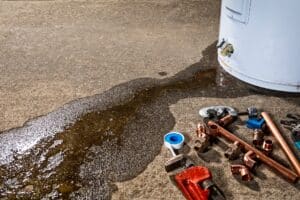
Why Older Bay Area Homes Are Prone To Hidden Leaks
The Bay Area is full of beautiful older homes, but these architectural creations often come with outdated plumbing systems. Pipes made from galvanized steel, cast iron, or copper are prone to corrosion over time, which can lead to hidden water leaks in walls, floors, and ceilings.
The climate and grounds of the Bay Area also pose challenges, with shifting soils leading to foundation stress that can impact your plumbing. Many parts of the Bay Area have hard water, and the mineral build-up can increase corrosion inside your pipes.
Common Causes of Water Leaks Behind Walls or Under Floors
From home plumbing issues to Bay Area soil, there are plenty of factors that can cause plumbing leaks in old homes.
Aging Plumbing Systems
As your plumbing ages, mineral build-up and rust naturally lead to pipe corrosion in older homes. Many older Bay Area homes use cast-iron or galvanized steel pipes that have exceeded their lifespan and are even more likely to leak. Since these pipes run all through your home, it’s common to see leaks behind walls or under floors.
Weak Connections
Issues with your plumbing when it was first installed or repaired often show up in the soldering and pipe connections. Joints and pipes under high tension may be more prone to leaking.
Shifting Foundations
The Bay Area sits on a fault line, which means the soil and landscape are prone to tiny shifts that you may not even notice. However, your home will feel them. As soils move over time, they put pressure on various parts of your home, including your plumbing. If this pressure becomes too high, leaky or burst pipes can occur anywhere in your home.
Appliance Issues
Common household appliances like water heaters, dishwashers, and laundry machines can sometimes break, leading to hidden leaks. This can also be an issue for HVAC components like air conditioners, which require condensate lines to get rid of excess water. If one of these water lines breaks or leaks, water can build up inside your walls or floors.
Clogs and Plumbing Problems
Common plumbing problems, such as high water pressure or clogs, can affect your home. If a clog travels or gets stuck in the pipes in your walls or floors, it can lead to a leak or burst pipe in unexpected places.
How To Spot the Early Signs of Hidden Plumbing Leaks
Learn how to spot hidden plumbing leaks before they lead to costly water damage. Keep an eye out for common signs of hidden water damage:
- Musty smells: Odors may be the first sign of mold growth inside walls, floors, and attics.
- Water stains: Water stains on drywall can often appear as brownish or yellowish discoloration.
- Peeling or bubbling paint: This can signal moisture underneath the paint. In extreme cases, the area may also feel soft or spongy to the touch.
- Unusual noises: Dripping, hissing, trickling, or tapping can all signal hidden leaks.
- Unexplained rising water bills: The water loss from a leak can drive up your water usage bill even when you can’t see or hear the problem in your home.
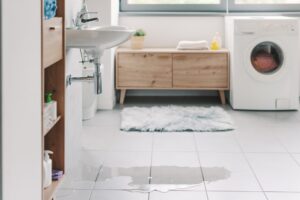
How To Prevent Leaks in Aging Plumbing Systems
Explore these simple water damage prevention tips to keep your aging plumbing system protected from hidden leaks.
Avoid chemical cleaners
While chemical cleaners may make the job go quicker, they take a long-term toll on your plumbing. Harsh chemicals increase corrosion in your pipes, increasing the risk of leaks. Instead, opt for gentle cleaning solutions like baking soda, vinegar, and hot water.
Be careful what goes down the drain
Take care of your plumbing by flushing only waste and toilet paper, and avoid flushing items like wipes or personal items. If you have a garbage disposal, avoid bones, avocado pits, oils, grease, fats, and fibrous items like corn husks that frequently cause clogs.
Schedule Professional Drain Cleaning
If your home is prone to clogs and other plumbing challenges, professional drain cleaning can be the best way to keep things running properly. Scheduling drain cleaning every 12 to 18 months takes care of issues like clogs without putting any excess strain on your plumbing (and helps get the tough clogs you can’t reach with DIY methods).
Consider Old Pipe Replacement
Your plumbing inspector can assess the condition of your pipes and advise you on the best care options. In some cases, routine maintenance is enough to keep everything flowing smoothly for a while. However, if you have old pipes, such as galvanized steel or cast iron nearing the end of their expected lifespan, it may be time to consider a full home repiping to reduce the risk of widespread leaks.
The Importance of Professional Leak Detection
If you suspect a leak in your home, the best way to resolve the issue is to call for professional water leak detection. A licensed plumber can use tools like moisture meters and thermal cameras to detect the leak without impacting your home any more than necessary.
Professional leak detection is key to detecting leaks as quickly and efficiently as possible. Without prompt water leak repair, hidden leaks can quickly lead to widespread water damage that impacts your plumbing, walls, furniture, and the structural integrity of your home. Even slow leaks can cause mold, electrical issues, and rising water costs.
TRIO Heating, Air & Plumbing offers professional detection services to reduce the risk of costly repairs and get your home back to normal quickly.
Why Routine Plumbing Inspections Save Time and Money
In addition to good plumbing habits, the best way to prevent hidden leaks is to schedule routine Bay Area plumbing inspections. It’s recommended to book a professional plumbing inspection at least once a year for older homes. Your inspector will check the condition of your pipes, examine your home for leaks, and keep an eye out for early signs of plumbing issues so they can get fixed before they cause damage.

Schedule a Leak Detection Appointment With TRIO Heating, Air & Plumbing
If you’ve noticed an odd smell, a discolored patch of paint, or rising water bills, the TRIO Heating, Air & Plumbing team is on hand with professional leak detection for your Bay Area home. Our licensed plumbers are experts at detecting moisture in walls and other hidden spaces, locating the cause of the issue so it can be fixed quickly. Contact us today to schedule a leak detection appointment.
Winter Plumbing Problems: The Most Common Cold-Weather Issues in Bay Area Homes
San Francisco Bay Area residents have their share of winter plumbing problems, even with the area’s moderate climate. The biggest issues come along with sewage backups, clogged drains, and frozen pipes, like contamination from wastewater, and structural damage to your home from flooding.
Let’s explore the most common plumbing issues Bay Area folks face in the winter, why pipes freeze in California, what you can do to prevent burst pipes, and when to call TRIO Heating, Air & Plumbing for expert plumbing services. Our plumbers offer high-quality repair services when you need them most, along with plumbing inspections, maintenance, and replacement.
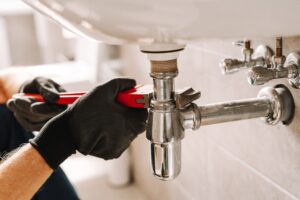
Why Winter Causes Plumbing Problems in Bay Area Homes
It may come as a surprise to the rest of the country, but along with steady rain and all the issues wet winters bring, Californians can also face below-freezing temperatures. In fact, frozen and burst pipes are some of the most common winter plumbing problems that homeowners in the area have to handle every year.
Because homes in the area don’t have as much pipe insulation for winter weather as homes in other states do, when temperatures plummet below 32°F, the pipes in exterior walls of the house, unheated crawl spaces and garages, attics, and other cool spots are at risk. Water inside the plumbing freezes until the pipe becomes completely blocked, expanding until the pressure increase causes cracks or ruptures.
If you have any hidden leaks due to frozen pipes, you may notice signs like:
- A musty smell with no obvious source.
- Visible water stains, peeling wallpaper, or bubbling paint.
- Wet spots pooling around fixtures or appliances.
- A sudden increase in your water bill.
- Low water pressure.
The Most Common Cold-Weather Plumbing Issues
Along with frozen pipes, other common cold-weather plumbing issues in the Bay Area include:
- Stress and cracks: Underground clay soil expansion and contraction happen as temperatures rise and fall. These fluctuations can cause the ground to shift and may put stress on your plumbing system.
- Low water pressure: When your pipes start to freeze, the plumbing system in your home will become blocked with ice, restricting the flow, which leads to low water pressure in the winter.
- Clogged drains: Colder pipes can cause grease and grime in your pipes to thicken and harden faster than they normally would, resulting in more clogs than usual.
How to Prevent Frozen or Burst Pipes This Winter
The best ways to prevent frozen pipes in the Bay Area are:
Schedule Regular Plumbing Inspections
Annual plumbing inspections will allow a professional plumber to check your entire system for weaknesses like existing cracks and loose joints that could worsen over the winter. Our experienced plumbers will use modern leak detection equipment to ensure your system is safe to use, and if we find any issues, we’ll offer transparent fixes you can trust. We can also give tips on how to prevent frozen pipes in the future, so you’re prepared for next year.
Prepare Outdoor Faucets and Spigots
Disconnect all hoses and accessories from your outdoor faucet, then turn off the water to the spigot at the water line shut-off valve inside your home. Once the water’s turned off, open the faucet to let the remaining water inside the pipes drain out, then close it again. You may also want to add a faucet cover for extra protection, especially if the area is poorly insulated.
Know How to Prevent Further Damage
It’s important to know how to prevent further damage in case of a plumbing emergency. Make sure everybody in your home knows where the emergency shutoff valve is, and who to call for fast burst pipe repair in your area.

What to Do If a Pipe Freezes or Bursts
Signs of a frozen pipe include:
- Restricted or no water flow from one or more fixtures in your home.
- Frost or excess condensation on a visible pipe.
- Unusual banging or gurgling sounds from the plumbing.
In some cases, you can thaw a frozen pipe yourself. Turn the water off, then open the connected faucets to relieve pressure before applying gradual heat from a towel soaked in hot water, a hair dryer, or other gentle heat sources (not an open flame).
If you can’t do it yourself, don’t feel confident, or the pipes aren’t accessible, we’re here to help. Call TRIO Heating, Air & Plumbing, and schedule emergency plumbing service.
Other Seasonal Plumbing Issues to Watch For
Along with icy pipes, some other common cold-weather plumbing issues to look out for include:
- Heavy rains that cause moisture issues, flooding, clogging, and sewage backups.
- Increased hot water use strains the water heater, and leads to breakdowns.
- Oversaturated soil encourages tree roots to grow into pipes, leading to blockages.
When to Call TRIO for Emergency Plumbing Repair
At TRIO Heating, Air & Plumbing, we provide fast emergency plumbing repair services, arriving quickly when your plumbing problem can’t wait. This includes:
- Burst pipes and major leaks: When lots of water is flooding out of a burst or leaking pipe, it can cause serious structural damage to your home. Turn off the water at the main water valve first, then call us for immediate assistance.
- Frozen pipes: We’re available to assist you in safely thawing out your frozen pipes. Let us do it for you, so you can relax knowing professionals are taking care of the problem the right way.
- Sewage backups: While sewage backups aren’t just a winter issue, they’re more common during periods of heavy rainfall. If your drains smell foul or there’s any wastewater backing up into your home, call a professional plumber for emergency repair.
Timely action will reduce your risk of:
- Serious water or sewage damage in your home
- Costly plumbing repairs
- Health and safety risks

Protect Your Home with Winter Plumbing Services from TRIO
Contact TRIO Heating, Air & Plumbing to book your next plumbing inspection. Our state-licensed plumbers are available to ensure your plumbing system is in optimal condition. We’re happy to provide you with helpful Bay Area winter plumbing tips. We can also find the areas most vulnerable to freezing and clogs, add pipe insulation, clean your plumbing system, and prepare your home for the winter.
There’s no plumbing issue too big or too small for our experienced plumbers to handle. Call TRIO Heating, Air and Plumbing at (415) 226-4257, or send an email using our online form to get started.
Why Your Furnace Struggles in Cold Weather (and How To Fix It Before a Breakdown)
In cold weather, homes lose heat more quickly, and furnaces sometimes struggle to meet high heating demands. When your furnace cycles longer or more frequently, minor or undetected issues may become obvious and problematic. Understanding common causes of furnace problems in the winter and the signs it’s time to schedule furnace repairs helps you prevent major breakdowns.

Common Causes of Furnace Failure in Winter
Cold weather amplifies existing weaknesses across your heating system, and understanding the contributing causes of furnace failure helps you take proactive measures.
Faulty Thermostat
The thermostat is the central hub that determines when your heating starts and stops. Even small errors can disrupt furnace performance. Faulty sensors, worn wiring, drained batteries, or placement near drafts or heat sources cause inaccurate temperature readings and improper communication between the thermostat and control board. As a result, heating cycles may start and stop erratically, leaving rooms cold and straining internal components.
Heavy Demand
Cold weather causes furnaces to run longer and more frequently to maintain indoor temperatures, especially during severe or prolonged cold. In contrast, heating equipment that worked efficiently in mild winter weather may struggle to keep up. This sustained demand pushes ignition components, motors, burners, and other parts to operate near their limits, accelerating wear and increasing the likelihood of furnace failure.
Worn or Aging Components
Blower motors, igniters, belts, bearings, and other components gradually wear, reducing your furnace's efficiency as it approaches the end of its operating life. In severe winter conditions, these aging parts are more susceptible to mechanical and thermal stress, increasing the risk of failure.
Improper Sizing
Correct furnace sizing determines how well it performs under heavy load. An undersized unit may run continuously without heating the home evenly, increasing wear and overheating risks. An oversized unit may short-cycle, ending heating cycles prematurely before warm air circulates throughout your home, reducing comfort and causing unnecessary stress on internal components.
Restricted Airflow
Proper airflow allows your furnace to transfer heat safely and efficiently. Clogged air filters, damaged blower motors, and poorly designed duct layouts restrict air movement. Restricted airflow causes heat to build up inside the furnace rather than reaching living spaces, potentially leading to safety shutoffs, uneven heating, and reduced efficiency during peak winter operation.
Leaky Ductwork
Leaky ducts allow heated air to escape into attics, crawl spaces, or wall cavities before it reaches your indoor spaces, forcing your furnace to run longer to reach the thermostat set point. Even small gaps at joints, disconnected sections, or poorly sealed boots behind registers can cause significant strain on components and efficiency losses in winter because the temperature difference between supply air and surrounding spaces is substantial.
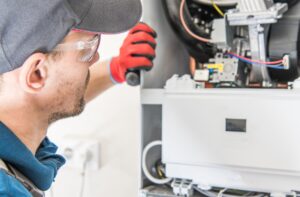
Signs Your Furnace Needs Immediate Attention
Furnaces often give early warnings before a complete shutdown. Recognizing these signs of furnace failure allows you to schedule furnace repair near you promptly, before small issues become emergency calls:
- Uneven heating: Some rooms stay cold while others feel overheated, often due to airflow problems or short cycling.
- High utility bills: A sudden increase in heating costs indicates underlying issues and furnace strain that reduce overall heating efficiency.
- Short cycling: Frequent heating stops and starts often stem from incorrect sizing, restricted airflow, or thermostat issues.
- Continuous operation: A system that runs continuously without reaching the set temperature may be underpowered or losing heat through gaps in the ductwork.
- Strange odors: Burning, dusty, or metallic smells may result from overheated components or debris accumulated inside the system. Rotten-egg odors may indicate a gas leak and require emergency evacuation and repair.
- Abnormal sounds: Rattling, grinding, or banging noises often indicate loose parts, motor strain, or ignition problems.
- Error codes: Modern furnaces display fault codes when sensors detect unsafe or abnormal operation.
How To Prevent a Furnace Breakdown Before It Happens
Proactive strategies prepare your furnace for peak winter demand and reduce the risk of sudden breakdowns. Try these tips:
- Schedule regular maintenance: Furnace maintenance services allow technicians to inspect and clean components, adjust parts, and correct small issues before they escalate.
- Replace filters regularly: Clean filters enable proper airflow, reduce strain on blower motors, and improve heat distribution and comfort.
- Keep vents open and unobstructed: Blocked registers restrict airflow, causing pressure imbalances and uneven heating.
- Check your thermostat settings: Accurate programming and fresh batteries help the furnace respond correctly to temperature changes.
- Schedule repairs promptly: Responding to warning signs early can help prevent more severe, costly breakdowns during extreme cold.
DIY Troubleshooting vs. Professional Furnace Repair
Troubleshooting furnace issues at home can help you rule out simple causes before scheduling service when your furnace isn't working. Basic troubleshooting includes:
- Checking thermostat settings, calibration, and power supply
- Inspecting circuit breakers and resetting if necessary
- Replacing clogged air filters
- Checking for blocked vents
If your furnace continues to struggle despite DIY troubleshooting, consult a licensed HVAC technician for accurate, safe repairs. Delaying professional furnace repair may lead to DIY mistakes, higher repair costs, and safety risks from gas leaks or carbon monoxide. A licensed HVAC technician has the skills, experience, and knowledge to handle gas lines, electrical components, and other sensitive or potentially hazardous parts and can pinpoint the underlying issue to deliver a lasting solution.
When To Call TRIO for Emergency Heating Repair
If basic troubleshooting doesn't prevent a furnace breakdown or restore heating to your home, contact TRIO Heating, AIR & Plumbing. These conditions may warrant emergency heating repair:
- Your household includes vulnerable individuals, such as children, seniors, or people with medical needs.
- The furnace stops producing heat during freezing temperatures.
- The system shuts down repeatedly after checking thermostat settings, breakers, and the air filter.
- You notice an odor associated with gas, or a carbon monoxide alarm activates.
- You notice loud or unusual noises, such as screeching from the blower or banging from the heat exchanger.
TRIO Heating, AIR & Plumbing provides responsive emergency furnace repair to restore safety and comfort. When you call us, we pinpoint the cause, explain options in plain language, and provide rapid solutions to improve long-term efficiency and ensure safe operation.

Stay Warm This Winter With Help From TRIO Heating, AIR & Plumbing
Schedule a furnace inspection or furnace repair with TRIO Heating, AIR & Plumbing before the next cold snap so your system is ready for winter demand. Our licensed professionals provide fast emergency heating repair services to ensure your comfort and peace of mind during harsh conditions. Contact us today to schedule your furnace repairs.
Why Regular Drain Cleaning Prevents Big Plumbing Problems
Proactive plumbing care, such as regularly scheduled professional drain cleaning, is smart because it prevents costly problems and delivers peace of mind. You can relax knowing your drains will carry away wastewater without issue while enjoying long-term savings with fewer repairs.
TRIO Heating, Air, and Plumbing offers comprehensive drain cleaning services, keeping residents of the Greater San Francisco Bay Area comfortable and their plumbing working properly. Our professional plumbers are licensed, insured, and experienced in delivering high-quality plumbing work to Californians at a reasonable price.
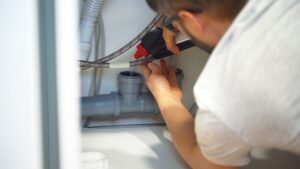
Why Regular Drain Cleaning Is Crucial for Your Plumbing System
Regular drain maintenance is important because it:
- Prevents clogs from forming: Over time, soap, hair, food particles, grease, and other debris accumulate along the sides of your pipes, eventually forming a blockage. Regular cleaning removes this buildup before it can turn into a harmful clog.
- Prevents backups: Clear pipes are much less likely to clog, removing the risk of water damage or sewage entering your home.
- Removes bad smells: Bacteria and mold can grow on pipe buildup and may begin to smell. If your drains smell bad, schedule drain cleaning today.
- Extends the lifespan of your plumbing system: More efficient, freely flowing water means less damage and corrosion on your pipes.
Common Signs Your Drains Need Cleaning
Some of the most common signs that your drains need cleaning include:
- Standing water: When the water in your sink or tub has nowhere to go, it’ll pool. If your water isn’t flowing down the drain properly, it’s a sign you need to call a plumber.
- One or more slow drains: Although a single slow drain may not be a serious issue, multiple slow drains often indicate a clog further down the plumbing system. Book a drain cleaning appointment to clear the drains and prevent plumbing backups.
- Backups: You never want sewage flowing into your house. It should always move out, toward the municipal sewer line. If there’s a clog, it could cause sewage to back up into your shower or sink drains or cause your toilets to overflow.
- Unusual noises: If you hear sounds like gurgling or bubbling in the pipes, it could be because something is trapping air inside, which then moves through the pipes as water flows past.
- Foul odors: Bad smells from the drains could indicate waste buildup in the pipes or sewage flowing where it shouldn’t be. Don’t ignore foul odors in your plumbing. It’s almost always a sign of bigger problems in the pipes.
- Drain flies: One of the least pleasant signs of drain blockage is the appearance of drain flies. These tiny bugs thrive in damp environments with a food source, such as a drain clog. Professional cleaning will remove these pests from your home.
The Hidden Dangers of Ignoring Clogged Drains
While a clogged drain might not seem serious, it can turn into a situation that requires emergency plumbing repair, or worse. Without regular drain maintenance, you put your home and your plumbing system at risk.
Clogged drains can:
- Damage your plumbing system: Clogs can create high water pressure in your pipes, causing them to crack or burst from the constant stress.
- Cause water damage: Backups and leaks can lead to serious water damage in your home, including mold and mildew growth and structural rot.
- Increase the chance of pest infestation: Flies, cockroaches, beetles, and other pests are attracted to dark, damp spaces with readily available food sources, including drain clogs. If they get in, they won’t want to leave.
- Create health risks: Stagnant water and rotting organic materials provide a breeding ground for bacterial growth and mold. Sewage backups are even more insidious, as the water may contain bacteria and viruses, and the sewage gas can be toxic.
- Lower your home’s value: If potential buyers learn about ongoing clog or drainage issues, they’ll be less likely to pay what you’re asking for your home.
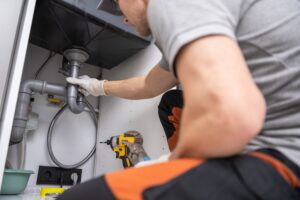
How Often Should You Schedule Drain Cleaning?
We recommend scheduling professional drain cleaning every 1–2 years. In some cases, more frequent cleanings are better when:
- You’ve experienced frequent drain clogs.
- You have a large household.
- You have a commercial kitchen or run a food-related business.
- Your plumbing is aging.
- You have large trees growing near your sewer lines.
In these cases, we recommend scheduling maintenance appointments every 6 months or so. You should also book with a plumber for clogged drain solutions at the first sign of trouble.
DIY vs. Professional Drain Cleaning: What You Should Know
You may be able to clear a clog from your plumbing using boiling water or a plunger, but preventative professional cleaning will stop the clog from forming in the first place. Some reasons to choose professional plumbing services over doing it yourself include:
- Considering the cost of equipment and the amount of work involved, it may be more cost-effective in terms of both time and money to hire a professional to clean your drains than to do it yourself.
- Using chemical drain cleaners will not keep your drains clean. Most drain cleaning chemicals are corrosive and can actually damage your pipes.
- Along with drain cleaning, most appointments will include a thorough drain pipe inspection.
- Plumbers know what to do if they encounter another problem while working, such as a leaky pipe, tree roots, or corrosion. They can identify and address the underlying cause of recurring clogs, preventing them from happening again.
- Your plumbing system is complex and involves health and safety hazards that professionals are trained to deal with.
At TRIO Heating, Air, and Plumbing, our plumbers know how to keep drains clear without causing damage. We use specialized equipment and professional techniques to safely clear your plumbing system, ensuring that water and waste flow as they should.
Long-Term Benefits of Preventive Drain Maintenance
Long-term benefits of preventive drain maintenance include:
- Preventing hazardous sewer backups.
- Not needing costly emergency services or water leak repairs as often.
- Extending your plumbing system’s lifespan by preventing damage and reducing wear and tear.
- Ensuring long-term comfort and excellent performance, so your sinks, showers, tubs, and toilets continue to work properly.

Schedule Professional Drain Cleaning with TRIO Heating, Air & Plumbing
Ready to schedule affordable drain cleaning near you? When you choose us for professional drain cleaning, you’ll:
- Avoid costly plumbing emergencies.
- Protect your home’s pipes and sewer system.
- Improve drainage performance and water flow.
- Gain peace of mind with expert service.
Contact TRIO Heating, Air & Plumbing today to book your next drain cleaning or drain inspection appointment. From water heater installation to water leak repairs, our team is available now to help you.
The Importance of Attic Insulation: A Winter Maintenance Guide
As cold weather approaches, many San Francisco Bay Area homeowners focus on heating system tune-ups and weatherproofing doors and windows. To stay warm and reduce energy costs, it’s equally important to prepare your attic insulation for winter conditions.
Without adequate attic insulation, your HVAC system works harder to maintain a consistent temperature, resulting in higher utility bills and uneven heating. This winter maintenance guide explores why energy-efficient insulation is important, how much insulation you need for your attic, and which options work best for Bay Area homes.
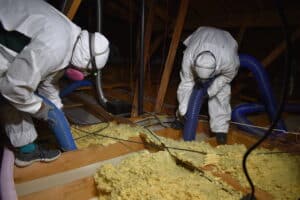
Why Attic Insulation Matters in Winter
Heat naturally rises, which means without a proper barrier in your attic, warm air escapes through your roof while cold air seeps in. Attic insulation helps maintain the temperature you've paid to create inside your home.
In the San Francisco Bay Area, winter temperatures typically range from the low 40s to mid-50s, with occasional dips into the 30s. Bay Area homes experience morning fog, coastal moisture, and varying microclimates, from windswept coastal areas to warmer inland valleys. Attic insulation and air sealing strategies need to be tailored to your specific location.
Energy-efficient insulation also prevents moisture buildup in your attic space. When warm, humid air from your living areas meets cold surfaces in an under-insulated attic, condensation can form, potentially leading to mold growth and structural damage over time. One of the added benefits of attic insulation is that it contributes to a healthier home environment for your family.
Common Signs Your Attic Needs Better Insulation
When you notice these telltale signs your attic needs more insulation, you can address potential problems before you waste more energy or experience cold discomfort.
- Higher energy bills without a corresponding change in usage, suggesting your attic may be losing heat, and your HVAC is working extra hard to compensate
- Cold spots or uneven temperatures throughout your home, especially in upper-floor rooms or near exterior walls
- Ice dams on the roofs of higher-elevation homes, which develop when heat escapes through the roof during winter storms
- Drafts and cold air coming through light fixtures, outlets, or attic access points due to poor sealing
- Visible insulation issues, like if you can see the floor joists in your attic because the insulation is insufficient
How Proper Insulation Improves Energy Efficiency
Better insulation means less heat transfer between your living space and the outdoors. When your home maintains its temperature naturally, your heating system cycles less frequently, consuming less energy and reducing wear on equipment.
Northern California homeowners who invest in proper insulation installation typically see lower monthly utility bills and reduced HVAC maintenance needs. Proper attic insulation and air sealing can help many homeowners save 15% or more on total energy bills. Homeowners in Santa Clara and San Mateo Counties may qualify for incentives through local energy efficiency programs, which help offset the initial installation costs.
Before adding new insulation, proper air sealing is fundamental to maximizing performance. Gaps around pipes, wiring, and attic access points allow conditioned air to escape even with adequate insulation in place. Sealing these air leaks first creates a more effective thermal envelope.
Best Types of Attic Insulation for Cold Weather
The best attic insulation for cold weather depends on your home's configuration, existing insulation, and budget. Several materials work well in Bay Area climates:
- Fiberglass insulation remains the most popular choice due to its effectiveness and affordability. Made from fine glass fibers, it can be installed as batts or blown-in loose fill.
- Cellulose insulation consists of recycled paper products treated with fire-resistant chemicals. This eco-friendly option performs well in cold weather and is particularly effective at filling irregular spaces.
- Blown-in insulation, whether fiberglass or cellulose, excels at covering hard-to-reach areas and creating a seamless thermal barrier. Professional installers use specialized equipment to distribute the material evenly throughout your attic space.
As part of your winter insulation checklist, consider the material, thickness, coverage, and installation quality, especially in hard-to-reach places.

How Much Insulation Do You Need in Your Attic?
The Greater San Francisco Bay Area lies mainly in Climate Zone 3. The suggested R-value attic insulation range for uninsulated attics in this area is R30 to R60, although ENERGY STAR recommends R49 for optimal efficiency standards. If you already have three to four inches of existing insulation, adding R25 to R38 can bring your attic up to recommended levels.
Different materials have different R-values, which measure how well a material resists heat flow, so calculating how thick your attic insulation should be depends on the insulation material you choose:
- Fiberglass batts provide around R2.9 to R3.8 per inch.
- Loose fiberglass provides around R2.2 to R2.9 per inch.
- Cellulose fibers provide around R3.6 to R3.8 per inch.
- Modern mineral wool provides around R4.0 per inch.
In other words, to achieve R38 to R49, you’ll typically need anywhere from 13 to 18 inches of insulation depth. Proper attic insulation installation matters as much as quantity. Uneven distribution or compressed insulation loses effectiveness.
Professional vs. DIY Attic Insulation: What to Know
Professional attic insulation installation is often the smarter choice. Experienced installers bring expertise in identifying problem areas, properly sealing air leaks before adding air insulation, and achieving more even coverage throughout your attic space.
Installation quality significantly impacts performance. Compressed or poorly installed insulation can perform far worse than its stated R-value. Fiberglass batts that are squeezed into tight spaces lose their insulating properties because the air pockets that provide thermal resistance become compressed.
The cost of attic insulation installation by a professional varies based on material choice, attic size, and whether old insulation needs removal. While DIY might seem cheaper upfront, professional installation offers better long-term value through proper technique, warranty coverage, and access to energy rebates that often require professional installation to qualify.
What happens if you skip attic insulation before winter? You could face higher heating bills, uncomfortable temperature fluctuations, and increased strain on your HVAC system throughout the cold months.

Schedule Your Attic Insulation Service with TRIO Heating, Air & Plumbing
Don't wait until winter's chill leads to a drafty home. If you're searching for attic insulation services near you, TRIO Heating, Air & Plumbing offers professional installation throughout the Bay Area, helping homeowners enhance comfort while reducing energy costs.
Contact us today at (415) 226-4257 to schedule a professional attic insulation inspection and estimate. Let TRIO help you create a warmer, more energy-efficient home this winter season.
5 Signs Your Water Heater Needs Maintenance Now
Your water heater is one of your home’s most vital unsung heroes. These systems are responsible for every hot shower, clean dish, and fresh load of laundry, which means it’s a big problem when they shut down unexpectedly. The best way to avoid sudden water heater failures is by keeping up with preventative water heater maintenance. In this guide, we’ll explain why maintaining your water heater is so important and cover the top 5 signs that it’s time to schedule a water heater service appointment.
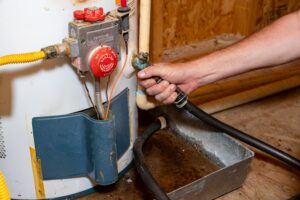
Why Water Heater Maintenance Matters
Water heater maintenance is vital when it comes to keeping your unit running safely, reliably, and efficiently. Over time, water heater sediment buildup forces the system to work harder and increases its energy usage. By flushing the tank and periodically maintaining the whole system, you’ll keep your energy costs to a minimum.
Safety is another major reason to learn how to maintain a water heater, especially if yours is gas-powered. Because of the extreme danger of gas leaks, it’s important to have your system periodically inspected and tuned up to ensure gas fittings are in good condition and don’t pose a risk to your home and family. And of course, proper maintenance helps to keep your system running smoothly, helping you avoid shutdowns, premature water heater repair, or even full system replacement.
1. Lukewarm or Inconsistent Hot Water
One of the most irritating and obvious signs your water heater needs repair or a tune-up is if the system is putting out lukewarm or inconsistently heated water. If your water heater isn’t heating properly, it can be a sign of a few issues.
If you’re getting hot water, but only in small amounts, it means one or both of the system’s heating elements have failed, and the parts will need to be replaced. If your water supply is steady, but it only reaches lukewarm temperatures, it’s usually caused by excess sediment buildup in the tank, meaning it’s time to flush the water heater.
2. Strange Noises Coming from the Tank
Another common issue is a water heater making noise while running. While some sound is expected, rumbling, popping, or high-pitched whining noises all indicate an issue with the unit. If the bottom of your tank is full of sediment, it can cause the unit to overheat, allowing water to boil inside rather than just heating up. Try flushing the tank to see if it stops the noise, and if not, contact a plumbing professional for help.
3. Discolored or Rusty Water
If water is coming out of your taps with a strange color or a rusty appearance, it usually means the water heater’s sacrificial anode rod needs to be replaced. This component is designed to rust before other components, protecting the rest of your system. But naturally, these sacrificial rods will need to be replaced once they’ve done their job — usually every 3 to 5 years.
4. Water Around the Base of the Tank
Obviously, the water is supposed to stay inside the tank. If you’re noticing water pooling around the unit, it usually means there’s a leaking pipe or connection nearby. If the leaking water is hot or warm, you can narrow down the problem to the outlet pipes. Checking and tightening these connections is a key part of routine water heater service.
5. Rising Utility Bills Without Explanation
A subtle but important sign that you need professional water heater maintenance is if you notice your energy bills rising without any change in your usage. As your system gets older, dirtier, and more worn out, it’s forced to work harder to do its job, meaning it consumes more electricity or gas. There are many reasons for rising energy bills, such as sediment buildup, a failing heating element, or general component wear.
The Benefits of Routine Water Heater Maintenance
Now that we’ve looked at a few water heater maintenance tips, why do homeowners need to keep up with this task? There are several benefits to regular water heater maintenance, including:
- Improved energy efficiency
- More reliable hot water supply
- Reduced chance of water heater shutdowns
- Less risk of a water leak damaging your home
- Extends the life of your water heater
- Ensures your safety from gas leaks or electrical hazards
- Saves you money on water heater repair and replacement
How often should you service your water heater? To get the full benefits listed above, we suggest getting your system professionally inspected, tuned up, and maintained once a year. This gives your plumbing tech a chance to not only clean and maintain the components but also to flush the tank, inspect all gas and water connections, and ensure the entire system is ready to run reliably and safely.

Schedule a Water Heater Check-Up with TRIO Heating, Air & Plumbing
With the right approach to water heater maintenance, homeowners can enjoy safe, reliable, and energy-efficient water heating for the full 8- to 12-year lifespan of their system. While some tasks are relatively DIY-friendly, such as flushing the tank or replacing the anode rod, many repairs and tune-up jobs are best left to the professional. Plus, when you allow an expert to maintain your water heater, you allow them to catch other issues with your system earlier on, protecting you from further damage or breakdowns.
If you’re looking for skilled, effective, and quick water heater maintenance, the team at TRIO Heating, Air and Plumbing has you covered. Our plumbing technicians have extensive experience working with water heaters of all makes and models, from conventional tank-style units like we discussed here, all the way to modern tankless systems. With our tools and knowledge at your disposal, you get the peace of mind knowing your unit has been tuned to perfection and is ready to serve your home for the year to come.
Ready to stop living in fear of that next water heater issue? Contact us today to schedule your next water heater service appointment.
